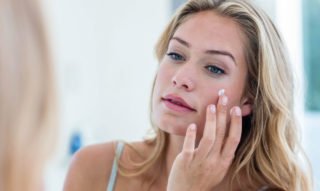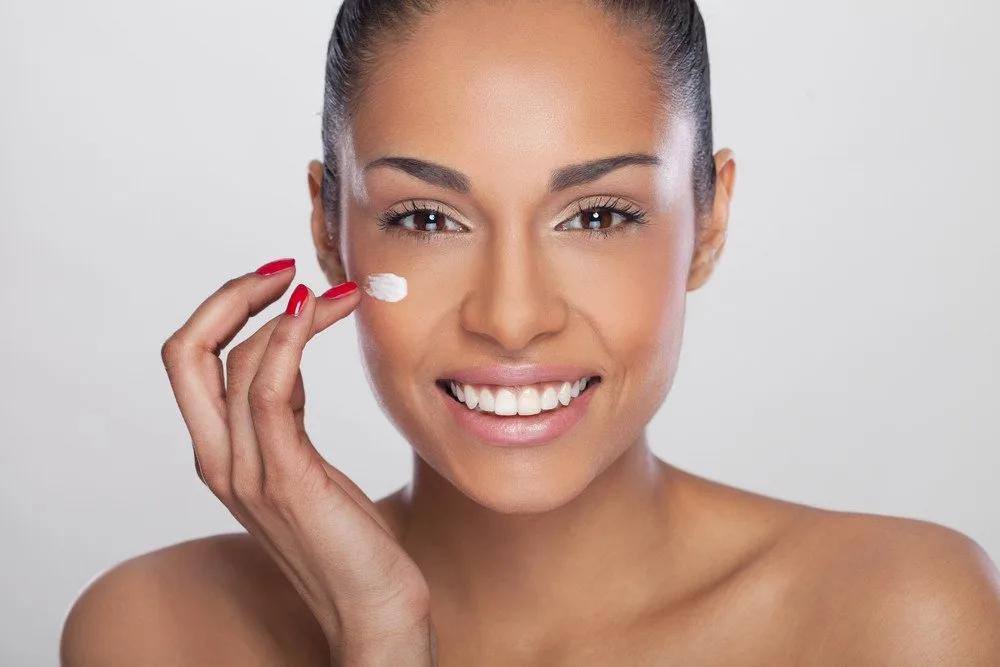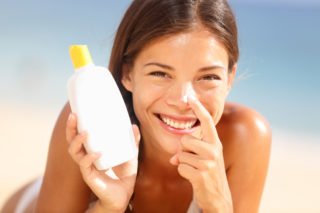Probably the most amazing organ in our body is the skin. It protects us from many dangers and connects most functions inside the body. But even more important, healthy, well-functioning skin is key to maintaining a healthy body and mind.
Our skin is our presentation to the world; the healthier we look, the healthier we feel. But as we age, the skin loses its clear texture, glow, elasticity, and plumpness, which is exacerbated by sun exposure.
Here are my 4 key steps to beautiful skin.
1. Moisturization is key
One of the most important factors in maintaining skin health is moisturization. Cleansing with harsh products such as soap can dry the skin. A very simple and old-fashioned cleanser is ung emulsificans, which has no preservatives or fragrance. Apply it to the skin and then gently wash it off with lukewarm water. While it acts as a cleanser, because of the greasiness of the product, it can also replace your moisturizer.

wavebreakmedia/shutterstock
With so many moisturizers on the market, it’s difficult to choose the correct one. Look for ingredients such as hyaluronic acid and niacinamide. Most moisturizers have antioxidant ingredients. Antioxidants help to counter the effects of the sun and help to remove oxygen radicals, which cause aging of the skin. Plant extracts are common antioxidants.
2. Sunscreen is no.1
If there was only one skincare product you could purchase, sunscreen should be it. Daily sunscreen use is a potent preventer of aging in most skin. There is infinite scientific evidence that daily sunscreen use, even through winter, can prevent and treat the signs of photo-aging. But it can also prevent skin cancer. The number of people affected by skin cancer is growing around the world. Although not all skin cancers are lethal, if allowed to grow, they may require extensive, painful treatments and surgery.
There are great sunscreen products available which combine photoprotection with anti-aging, through ingredients such as hyaluronic acid. For women, a tinted sunscreen has the added bonus of protection from the pigmentation effects of visible light through the addition of iron oxides.
 3. Retinol is anti-aging
3. Retinol is anti-aging
The most scientifically proven anti-aging molecule discovered is retinol, which has been proven to stimulate collagen and elastin fiber production. The mild exfoliation caused by retinol use improves glow while decreasing pigmentation. The large pores found especially on the nose decrease in size, giving the skin an overall finer, smoother complexion.
Retinol is difficult to use, as it can cause dryness and irritation of the face. Using a bland moisturizing cream on the skin first can help to prevent these effects. Start retinol use once a week and slowly build up to three times a week at night. Sunscreen must be used every day, as another side-effect is photosensitivity.
4. Treat yourself to a peel
Facial peels are a long-term investment in your skin’s health. They contain alpha-hydroxy acids such as glycolic acid. A single treatment is not sufficient; it’s best to do regular facial peeling with a therapist. However, there are several products available which contain various strengths of glycolic and other acids. Use these products with care, as they can also cause irritation.
In the end, a healthy lifestyle of good nutrition, sleep, and exercise, with a good dose of joy and laughter, is vital for skin health.
Who is the author?
 Dr Sian Hartshorne graduated from the University of the Witwatersrand in 1990, and completed her specialization in 1998, achieving both an FC Derm and an MMed in dermatology. She has published and presented several original research articles.
Dr Sian Hartshorne graduated from the University of the Witwatersrand in 1990, and completed her specialization in 1998, achieving both an FC Derm and an MMed in dermatology. She has published and presented several original research articles.
She is currently president of the SASDS (South African Society for Dermatologic Surgery), and is a board member of the DSSA (Dermatology Society of South Africa) and the AWDS (African Women’s Dermatology Society). She is an honorary dermatology consultant for the Eden district of the Western Cape, and has started a dermatology training service for all registrars and doctors in the district.



 3. Retinol is anti-aging
3. Retinol is anti-aging

![women [longevity live]](https://longevitylive.com/wp-content/uploads/2020/01/photo-of-women-walking-down-the-street-1116984-100x100.jpg)










